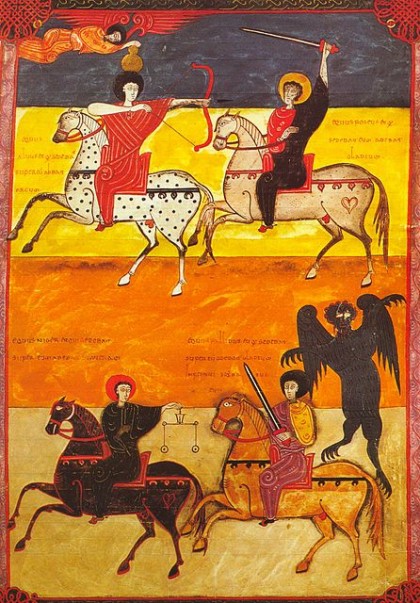Maybe Everything We Know is Wrong.
Devra Torres | Jul 16, 2016 | 1 cmt
Want to hear the most startling thing I've read in years?
Here you go:
What if we're not, actually, in the midst of everything falling apart? What if it's not a new epidemic, but only improved detection: becoming more aware than as a group we were, of how very much suffering there is and always has been?
If so, we could be in a different part of the story than we thought.
--Erin Arlinghaus (thanks to Melanie Bertinelli for bringing it to my attention)
A different part of the story than we thought.
Well, that sounds encouraging to me. Could we really be seeing it all wrong? The more I mull it over, the more plausible it sounds.
A differnt part of the story. What would that mean? Not just: Yes, the times are evil, but God can bring good out of it. Nor just: Well, things are worse than ever right now, but it's always darkest before the dawn. It's not, either, a question of imagining (or pretending) that things aren't really that bad. They are. We're not about to wake up and find that ISIS, or this entire election cycle, was just a nightmare.
But maybe we can shake the nightmarish sense of living amidst unprecedented evils, with no end in sight.
What, exactly, makes us so sure that things are getting worse and worse and worse? Why does it seem so self-evident? Well, for one thing, we've just come through the bloodiest century in the history of mankind. By some estimates, more Christians have ben martyred in the last few decades than in all previous centuries combined. We can't wish these horrors away.
If we take a good, hard look at our ability to compare the human suffering of one age with that of another, though, we notice something: to make an accurate comparison, we'd need a thorough, experiential knowledge of what it must have been like to live in another time--in all other earlier times.
How do you assess, for example, the suffering of a 40-year-old man living when the average lifespan was 30, but the aged were revered? How to compare it to, say, the suffering of a woman who dies at 75 in a nursing home where the aged are despised and hidden away? Or how to measure the physical pain of a 12th-century peasant without ibuprofen or antibiotics, against the spiritual agonies of a 21st-century atheist who, as far as he knows, has no reason to live?
We might feel very well informed because we're very much bombarded with information. We ricochet back and forth at the will of headline-writers ("Shock!" "Crisis!" "Breaking point!"). Media moguls have their own reasons for keeping us in a panic, but we don't have to play along. Good news seldom makes the news, but that doesn't mean there isn't any.
Besides, if we're getting better at detecting "how much suffering there is and always has been," that's a good thing. Detecting it is better than being oblivious to it, and could be a step towards relief. Some things have gotten better in exactly that way: it was once standard practice to shut away the "insane," the "retarded," and the "handicapped""--three over-broad categories that too many human beings were stuffed into for too long. In some ways, we've come a long way since then.
If we're really on the side of truth, "improved detection" is a decided step in the right direction. We should want suffering to manifest itself in a more obvious and unmistakeable way. We don't want to fall for "peace when there is no peace." Nor do we want to assume that te worst is upon us because the clickbait-mongerers, for their own reasons, want us to think so. What do they know? What do we know?
The poor, the hungry, and just about everybody who happen to be born in, say, Haiti or Afghanistan, probably have a far clearer vision of what part of the story we're in. They don't have the luxury of falling for the illusion that things have suddenly gone from pretty comfortable to dreadful. Life was plenty hard for them before the current wave of bad news.
People who think things are hopeless don't fight as effectively as those who have hope. The supernatural virtue of hope, rather than mere human optimism, is key, of course. But we may have more reason for mere human optimism than we had thought. We may be in a different part of the story.


Comments (1)
Drusilla Barron
Jul 17, 2016 3:58pm
From inside the story, we can't determine where we are. Neither can we determine if our suffering is worse than others have experienced throughout history, or whether things are worse today than they were in the past. None of these are our concern.
How compare the unprecedented deaths since 1980 of nearly 1.5 billion babies in the womb to the destruction of millions of people during WWII? History is replete with assaults and crimes that cry out to heaven for justice. How do we rank them?
And why try? The end of time is the beginning of eternity with God. We want that. Earth is a place to become strong enough to bear the joy of heaven. Earth is where we witness to Christ, let God use our crosses refine us for heaven and convert many more. The rest is simply distraction.
"He said to them, 'It is not for you to know times or seasons which the Father has fixed by his own authority. But you shall receive power when the Holy Spirit has come upon you; and you shall be my witnesses in Jerusalem and in all Judea and Samaria and to the end of the earth.'" (Acts 1:6-8)